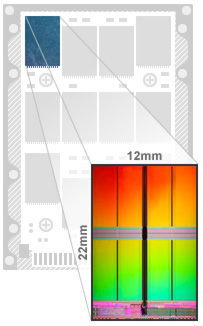TRUSTED EXPERTS
ANY DEVICE
Solid State Recovery
Cras vulputate vulputate nunc posuere dignissim.
Solid State Drives (SSDs) are an emerging storage technology that promises lower rates of failure than other forms of storage media. However, as with any form of data storage, these advanced drives still fail. Because the technology is so new in the marketplace compared to conventional HDD's, most data recovery firms have a lower success rate.

SSD Data Recovery is Best Left to Professionals
Many consumers don’t know that solid state technology has actually been around since the 1950s. Those early drives were used in the first vacuum tube computers, but were soon replaced by more popular standard disc drives.
The technology experienced a brief revival in the 1970s and 1980s, but the price of SSD's prevented widespread use by consumers and businesses.
The 2007 CES (Consumer Electronics Show) in Las Vegas saw the introduction of reasonably priced SSD's for consumer use. Today, the technology is quite common, but the recovery process remains complicated. That's due to how solid state operates compared to a conventional hard drive.
Start A Recovery
Get Started Below

SUCCESSFUL DATA RECOVERY
OR NO CHARGE!
Our customers store all types of data on these advanced drives, and we have successfully performed data retrieval for individuals, small businesses and Fortune 500 companies. We can usually perform a successful recovery operation within 24 to 48 hours. If, for any reason, we cannot retrieve the data from your device, there's no charge for our service.
SSD’s vs. HDD’s
A typical hard drive uses a disc to access data, along with a number of mechanical parts including: platters, spindles, actuators and read/write heads. It's similar to a vinyl record player, although on a much smaller scale!
A solid state drive uses NAND flash memory to access data and has no moving parts. SSD's are more shock resistant and are commonly used in smart phones, tablets and increasingly in laptops and desktop computers.


Physical failure is less likely with solid state drives, without moving parts they are much more durable. Less prone to physical shock & water damage, SSD's still fail by common accidents like shock damage or spilled coffee.
SSD's are also more reliable over time. Depending on the manufacturer, hard drives have a lifespan of 5 to 10 years with an average failure rate of 4%. SSD's by constrast fail due to age less than 1% and outlive other storage options.
Lifespan of Drive Types

However, SSD's are just as likely as conventional hard drives to experience logical software failure. Accidential deletion of files and software errors do happen. Let's uncover how by dicussing how memory works on a SSD.
Memory in Solid State Drives

Most solid state memory today utilizes NAND-based flash memory, which retains memory even without power. The architecture within these drives is even more complex than in most RAID systems because NAND flash memory chips are used in parallel to increase speed and performance. Data striping and interleaving further enhance the performance of today’s sophisticated technology.
These storage devices are manufactured with one of two types of NAND flash memory:
Logical Data Failure

When a block can no longer retain data, or when data errors cannot be corrected by the drive’s error correction algorithm, the drive’s controllers merely “select” another block. But when all spare blocks are used, the drive will fail and you’ll need specialized recovery services to retrieve your data.
Other common reasons for SSD failure and data loss include Abrupt Power Loss, Magnetic Fields, Electric Charges, Firmware failures along with other reasons.
Because of the complexity of these drives and recovery procedures, as well as significant variations in wear-leveling algorithms between manufacturers of solid state drives, it’s important to call experts with extensive experience with this type of technology. Do not attempt a recovery procedure on your own – this could result in permanent data loss.
SSD Data Recovery for Businesses & Government
Storing data on a solid state drive is common in the military and aerospace industries, and for other businesses. The reliability of this advanced storage option is a key reason. Yet, SSD's still fail whether you are a government municipality, Fortune 500 company or small business.
24 Hour Data takes the highest precautions to security to keep data safe. Our facility in Dallas, TX features multi-level intrusion detection and protection, and is managed and monitored 24/7.
We operate in a 100% secure environment within an ISO 5 (Class 100) certified clean room on an Isolated Secure Network with Enterprise Redundant Firewalls.
24 Hour Data is also a GSA approved contractor and has recovered data on solid state drives for the military, government agencies and Fortune 100 businesses.

Our Happy Customers



![]() I received the recovered files from my LaCie drive today and am in a total state of euphoria! Absolutely everything that I needed was recovered and, more than that, some extremely important files that will mean so very much to a lot of other people. There is no way that I could possibly be more pleased with the outcome.
I received the recovered files from my LaCie drive today and am in a total state of euphoria! Absolutely everything that I needed was recovered and, more than that, some extremely important files that will mean so very much to a lot of other people. There is no way that I could possibly be more pleased with the outcome.
John Stephens
Jail Hill Imaging
Start a data recovery today

You Can Trust Us with Your SSD Data Recovery
When a block can no longer retain data, or when data errors cannot be corrected by the drive’s error correction algorithm, the drive’s controllers merely “select” another block. But when all spare blocks are used, the drive will fail and you’ll need specialized recovery services to retrieve your data. Other common reasons for SSD failure and data loss include Abrupt Power Loss, Magnetic Fields, Electric Charges, Firmware failures along with other reasons.
Because of the complexity of these drives and recovery procedures, as well as significant variations in wear-leveling algorithms between manufacturers of solid state drives, it’s important to call experts with extensive experience with this type of technology. Do not attempt a recovery procedure on your own – this could result in permanent data loss.











